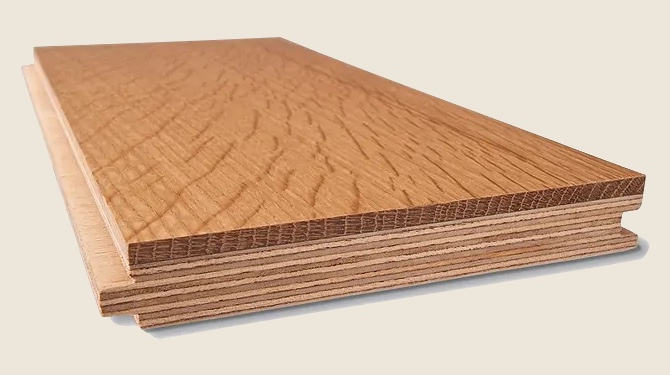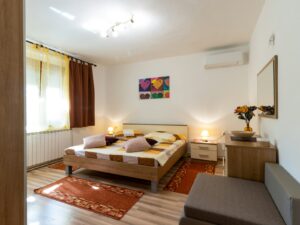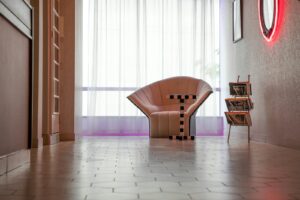Among the myriad options available, hardwood and engineered hardwood flooring stand out as popular choices for their durability, timeless appeal, and ability to enhance the value of a property. However, each type of flooring comes with its own set of advantages and drawbacks.
Pros of Engineered Hardwood
Durability and Stability: Engineered hardwood is constructed using multiple layers of wood veneer, topped with a hardwood wear layer. This construction enhances its stability and resistance to moisture, making it suitable for installation in areas prone to humidity and temperature fluctuations, such as basements and kitchens.
Cost-Effectiveness: Engineered hardwood typically comes at a lower price point compared to solid hardwood. Additionally, its ease of installation can reduce labor costs, making it a more budget-friendly option for homeowners seeking the look of hardwood without breaking the bank.
Environmental Sustainability: Engineered hardwood often utilizes fast-growing wood species for its core layers, reducing the demand for slow-growing hardwood trees. This makes it a more environmentally sustainable choice compared to solid hardwood, which may involve the harvesting of old-growth forests.
Versatility in Installation Options: Engineered hardwood offers greater flexibility in installation methods, including floating, glue-down, or nail-down options. This versatility allows for installation over various subfloor types, including concrete slabs, without compromising stability or performance.

Cons of Engineered Hardwood
Limited Refinishing Potential: Unlike solid hardwood, engineered hardwood has a thinner wear layer, limiting the number of times it can be refinished. While it can still be sanded and refinished to a certain extent, it may not withstand multiple refinishing cycles like solid hardwood.
Perceived Lower Value in Real Estate: Some homeowners perceive engineered hardwood as inferior to solid hardwood, which may impact its resale value. However, advancements in engineered hardwood technology have narrowed the gap in quality and appearance between the two options.
Variability in Quality: Not all engineered hardwood products are created equal. Quality can vary depending on factors such as the thickness of the wear layer, the type of adhesive used, and the manufacturing process. It’s essential to research reputable brands and select high-quality products to ensure durability and longevity.
| Aspect | Engineered Hardwood | Hardwood Flooring |
|---|---|---|
| Lifespan | 20-100 years (depending on wear layer thickness) | 100+ years |
| Material | Multiple layers of wood veneer | Solid wood planks |
| Cost | Varies from $3 to $15 per square foot | Varies from $8 to $20+ per square foot |
| Moisture | More resistant to moisture due to layered construction | Susceptible to moisture, requires proper sealing and maintenance |
| Core | Plywood or HDF (High-Density Fiberboard) | Solid wood |
| Heating Systems | Suitable for radiant heating systems | Suitable for radiant heating systems |
| Sizes | Standard sizes: 3-7 inches wide, various lengths | Varies widely: typically 2-4 inches wide, various lengths |
| Environmental Impact | May use fast-growing wood species, less impact on old-growth forests | Harvesting of hardwood trees, potential environmental consequences |
Pros of Hardwood Flooring
Timeless Beauty and Authenticity: Solid hardwood flooring exudes timeless elegance and authenticity that can enhance the aesthetic appeal of any space. Its natural grain patterns, rich colors, and unique character add warmth and charm to both modern and traditional interiors.
Longevity and Potential for Refinishing: Solid hardwood flooring is renowned for its longevity and ability to be refinished multiple times. With proper care and maintenance, hardwood floors can last for generations, retaining their beauty and value over time.
Adds Value to Property: Hardwood flooring is a coveted feature in real estate, often increasing the resale value of a home. Its durability, aesthetic appeal, and perceived quality make it an attractive selling point for potential buyers.
Hypoallergenic Properties: Unlike carpeting, which can harbor dust, allergens, and pet dander, hardwood flooring provides a hypoallergenic surface that contributes to better indoor air quality. This makes it an ideal choice for individuals with allergies or respiratory sensitivities.

Cons of Hardwood Flooring
Higher Initial Cost: Solid hardwood flooring tends to have a higher upfront cost compared to engineered hardwood. The price can vary depending on the species of wood, grade, and installation method, making it a significant investment for homeowners.
Susceptibility to Moisture and Temperature Changes: Solid hardwood is susceptible to moisture and temperature fluctuations, which can cause expansion, contraction, and warping over time. It’s not recommended for installation in areas with high humidity or below-grade spaces without proper moisture barriers.
Environmental Impact of Harvesting: The harvesting of hardwood trees for solid hardwood flooring can have environmental consequences, including deforestation and habitat loss. Sustainable forestry practices and certifications like FSC (Forest Stewardship Council) can help mitigate these impacts, but they remain a consideration for environmentally-conscious consumers.
Read More
Best Engineered Wood For Underfloor Heating
Laminate Flooring Over Engineered Hardwood
What Are The Different Types Of Hardwood Flooring?
Prefinished vs Unfinished Hardwood Flooring?





